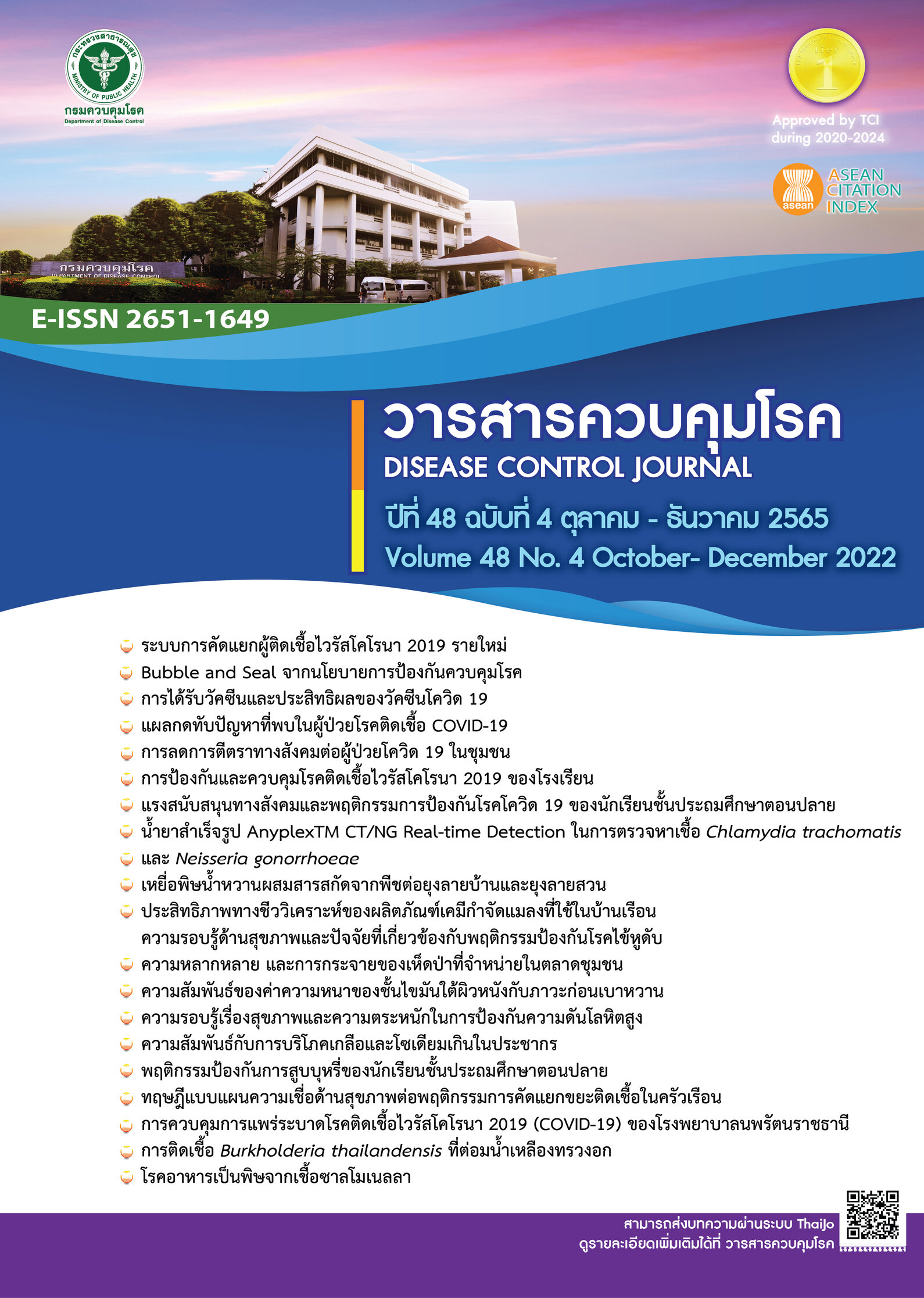Health belief model, social support and COVID-19 preventive health behaviors among senior primary school students in the area of Hua-Krok Tambon Health Promotion Hospital, Mueang district, Chon Buri province
DOI:
https://doi.org/10.14456/dcj.2022.66Keywords:
health belief model, social support, COVID 19, senior primary school students, Preventive Health BehaviorsAbstract
This cross-sectional survey study aimed to study the perception of susceptibility, severity, benefit, self-efficacy, cues to action, and social support factors toward COVID-19 preventive health behaviors among senior primary school students in the area of Hua-Krok Tambon Health Promotion Hospital, Mueang district, Chonburi province. The study population included 287 senior primary school students. Data were collected in March 2021 by self-administration questionnaire developed by researchers. Data were analyzed by using descriptive statistics, chi-square, and Pearson product-moment correlation. Study results showed that education, age, health belief model (except for perceived benefits) and social support were significantly associated with COVID-19 self-preventive behaviors score. Children’s good health and well-being depends on their perception. If they have more disease awareness, they will have more preventive behavior. Supporting and enabling factors included family, teachers, and easy access to information will increase their awareness. In addition, the advice, appreciation, and warning from their parents will also encourage them to improve their healthy behaviors. Based on these findings, it is therefore recommended to provide updated knowledge about COVID-19 prevention to the children through the development of various learning materials, inquire about their illness, appreciate and further advise them when they are following preventive behavior practices.
Downloads
References
National Institute for Public Health and the Environment (Neth). Children, school and COVID-19 [Internet]. Bilthoven. 2020 [cited 2020 Jul 21]. Available from: https://www.rivm.nl/en/novel-coronavirus-covid-19/children-and-covid-19
The committee of infectious prevention and control in Covid-19 pandemic crisis, the network of Phayathai and Paolo hospital. COVID-19 handbook: the spread of CORONA [Internet]. 2021 [cited 2022 Mar 16]. Available from: https://www.phyathai.com/covid19healthyalert/public_resources/img/covid19_handbook_EP2/handbook2.html#p=10 (in Thai)
Department of Diseases Control (TH). Daily updated situation of COVID-19. [Internet]. 2021. [cited 2021 Sep 11]. Available from: https://ddc.moph.go.th/covid19-dashboard/ (in Thai)
Coronavirus Disease 2019 Epidemic Situation Management Center, Chonburi Province. The situation of COVID-19, Chonburi Province. [Internet]. 2021. [cited 2021 Sep 11]. Available from: http://www.chonburi.go.th/website/project/view37 (in Thai)
World Health Organization. Coronavirus disease (COVID-19): Schools [Internet]. 2021 [cited 2021 Sep 10]. Available from: https://www.who.int/emergencies/diseases/novel-coronavirus-2019/question-and-answers-hub/q-a-detail/coronavirus-disease-covid-19-schools
Siriwannaboot P. Developmental Psychology. Bangkok: Chulalongkorn University; 2006. (in Thai)
Phetphoom C. Health Behaviors: Theory Concept and applying. 1st ed. Phitsanulok: Naresuan University; 2017. (in Thai)
Vagias WM. Likert-type scale response anchors. Clemson International Institute for Tourism & Research Development, Department of Parks, Recreation and Tourism Management. Clemson University; 2006.
Polemi N. Maritime Supply Chain Risk Assessment (at Entity Level) [Internet]. 2018 [cited 2020 Jul 21];67-102. Available from: https://www.sciencedirect.com/science/article/pii/B9780128118184000046
Panyanupap A. Factors affect to preventive behavior on smoking among male student in colleges under the provincial vocational education of Nakhon Pathom. [Thesis]. Nakhon Pathom: Silpakorn University; 2006. 153 p. (in Thai)
Sopha T. Factors related to the caries status in preschool children in the child development center Chiangdao district, Chiangmai province. Ganesha Journal 2013;9(2):81-95. (in Thai)
Wasan K. The Relationship with the Success of the Career of Service of Front Staffs in the Five Star Hotel, Bangkok, Thai Hospitality and Tourism Journal 2016;11(1):16-26. (in Thai)
Qoatrakul S. Educational Psychology. Bangkok: Chulalongkorn University; 2007. (in Thai)
Ketmaan P. Adolescence development [Internet]. 2020 [cited 2021 Mar 20]. Available from: https://shorturl-ddc.moph.go.th/J9PjD (in Thai)
Maiman LA, Becker MH. The Health Belief Model: Origins and Correlation in Psychological Theory. Health Educ Monogr 1975;2(4):336-53.
Sim SW, Moey KS, Tan NC. The use of facemasks to prevent respiratory infection: a literature review in the context of the Health Belief Model. Singapore Medical Journal 2014;55(3):160-7.
Rosenstock IM. Historical origins of the health belief model. Health Educ Monogr 1974;2(4):328-35.
Becker MH, Maiman LA, Kirscht JP, Haefner DP, Drachman RH. The Health Belief Model and Prediction of dietary Compliance: A field Experiment. J Health Soc Behav 1977; 18(4):348-66.
Wagner AL, Boulton ML, Sun X, Mukherjee B, Huang Z, Harmsen IA, et al. Perceptions of measles, pneumonia, and meningitis vaccines among caregivers in Shanghai, China, and the health belief model: a cross-sectional study. BMC Pediatrics 2017; 17(1):143-54.
Bonyan R, Al-Karasneh AF, El-Dahiyat F, Jairoun AA. Identification of the awareness level by the public of Arab countries toward COVID-19: cross-sectional study following an outbreak. J Pharm Policy Pract 2020;13(43):1-10.
Wassanasompong W. The Effect of Health Education program apply Health Belief model for prevention on common cold in grade 5 student [Thesis]. Bangkok: College of Allied Health Sciences, Suansunandha Rajabhat University; 2015. 409 p. (in Thai)
Phuangphay U, Sananreangsak S, Teerarungsikul N. Factors predicting health behaviors of school-age children in Singburi province. Journal of Nursing Science Chulalongkorn University 2017;29(1):92-103. (in Thai)
Nasir EF, Almahdi Yagoub HM, Alhag AK. Study of the Sudanese perceptions of COVID-19: applying the health belief model [Internet]. 2020 [cited 2020 Jul 21]. Available from: https://www.medrxiv.org/content/10.1101/2020.05.28.20115477v1
Becker MH. The Health Belief Model and Preventive Health Behavior. Health Educ Monogr 1974;2(4):354-86.
Caplan GM. The family as support system. In: Caplan GM, Killilea M, Editors. Support systems and mutual help: Multidisciplinary explorations. New York: Grune & Stratton; 1976.
Pilisuk M. Delivery of social support: The social inoculation. Am J Orthopsychiatry 1982;52(1):20–31.
Salee K. Predictors of health risk behaviors in late school-age children [Thesis]. Chonburi: Burapha University; 2558. (in Thai)
Downloads
Published
How to Cite
Issue
Section
License
Copyright (c) 2022 Disease Control Journal

This work is licensed under a Creative Commons Attribution-NonCommercial-NoDerivatives 4.0 International License.
Articles published in the Disease Control Journal are considered as academic work, research or analysis of the personal opinion of the authors, not the opinion of the Thailand Department of Disease Control or editorial team. The authors must be responsible for their articles.






